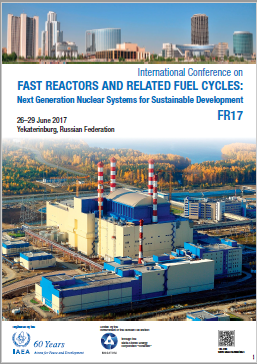Speaker
Mr
Balija Sreenivasulu
(IGCAR)
Description
Advanced fuels forms need to be developed for use with the evolving nuclear fuel cycles. The fabrication of sphere-pac fuel pins that employ microspheres of U,Pu mixed oxide (MOX) or microspheres containing the oxides of Minor Actinides (MA) prepared through the internal gelation process are particularly relevant in this context. Since the sol-gel process used in the fabrication of these microspheres offers significant advantages over the conventional powder metallurgical processes used in the fabrication of pellets, efforts are underway at IGCAR in collaboration with Bhabha Atomic Research Centre (BARC)), Mumbai in order to establish a remote handling facility suitable for fabricating a sphere-pac fuel pin containing MOX microspheres. This paper describes the details of a facility that is being created at IGCAR to accomplish the above and the recent experience on the test fabrication of sphere-pac fuel pins for test irradiation.
This facility comprises a jet-entrainment facility for the preparation of fine fraction UO2 microspheres (115±10 μm ), a column gelation facility for the preparation of the coarse fraction U, Pu MOX (53% Pu) microspheres ( 775±75μm ) through column gelation and equipment for characterization of the microspheres prepared in our laboratory. In addition a glove box train comprising facilites handling the microspheres, vibro-packing, fuel-pin welding and decontaminating the fuel pin was commissioned and qualified for handling MOX microspheres.
As many as 75 production runs were carried out for the production of UO2 microspheres with the jet entrainment set-up, earlier, in order to optimize the process parameters viz., size of the nozzle, temperature of gelation, composition of the broth, washing routine as well as the conditions for calcination and sintering. Both the MOX as well as the UO2 microspheres were checked for their physical integrity, dimensions and were found to conform to the desired chemical composition stipulated for the test irradiation in FBTR. Conditions for vibrocompaction were optimized. Quality control checks were performed on the fuel pins after the fabrication.
Trials were carried out for the preparation of Am containing UO2 fuel microspheres. The viscosity of a broth containing both U and Pu was measured in order to establish the optimum conditions for gelation of the sol. This is a “first of its kind” measurement, made in a custom-made facility created for this purpose.
Country/Int. Organization
India, Indira Gandhi Centre for Atomic Research, Kalpakkam
Author
Dr
Joseph Mathew
(Associate Director, FCG, IGCAR)
Co-authors
Dr
Ananthasivan Krishnamurthy
(Head, Fuel Chemistry Division)
Dr
Venkatakrishnan Ragavan
(Scientific officer (F))

